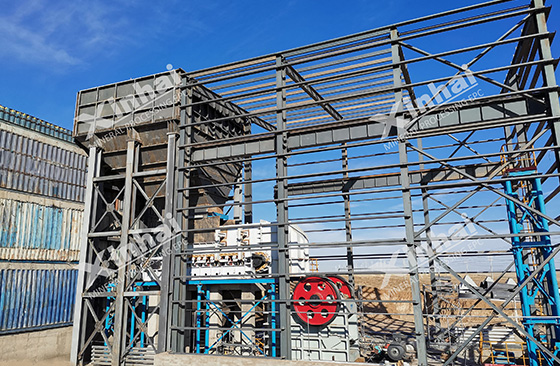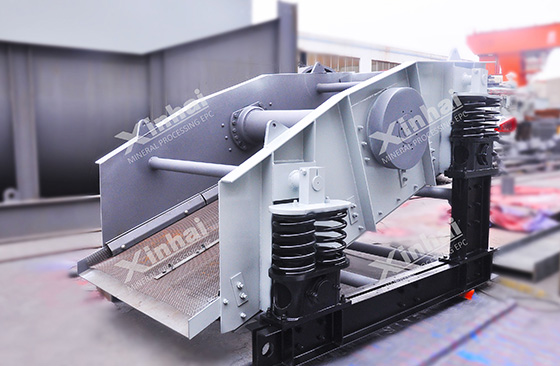Fluorite is an important fluorine resource, widely used in metallurgy, chemical industry, pesticides, fertilizers, glass, electroplating, plastics, artificial leather, rubber, chemical weapons and natural industries. If it is to be used in industrial applications, it needs to be purified by beneficiation methods. At present, the common beneficiation methods of fluorite ore include hand separation, gravity separation and flotation. The technological process is roughly the same, mainly including several stages of crushing and screening-hand selection-grinding and classification-separation and purification-dehydration. The following editor will introduce fluorite ore beneficiation equipment around these stages!

The main purpose of crushing and screening is to break the mined fluorite ore blocks into ore particles below 100mm through technical means, so as to complete the initial dissociation of minerals. According to the different properties of fluorite ore and different particle size requirements, three-stage one closed-circuit crushing, three-stage open-circuit crushing or two-stage one closed-circuit crushing process can be adopted. If there are magnetic minerals in the process, an iron removal device will be installed. Mainly used fluorite crushing and screening equipment are: crusher, screening machine, feeder, belt conveyor, electronic iron remover, metal detector, etc.
Crusher: jaw crusher is used for coarse crushing, and cone crusher is used for fine crushing.
Screening machine: circular vibrating screen is mostly used.
Feeder: According to the process design, there are several options for trough feeder, electromagnetic vibration feeder and pendulum feeder.
Belt conveyor: mainly responsible for the transportation of minerals at each stage to the next link.
Electronic iron remover: it is generally installed after the first stage of crushing and transported by the belt to remove the existing iron-containing impurities in advance.
Metal detector: Same as the electronic iron remover, it is installed after a broken section and is mainly used to detect iron-containing impurities in the conveyor belt.

Hand selection is generally used as an auxiliary means, using artificial naked eyes to identify fluorite and gangue, and through manual inspection, the ore fluorite is selected in advance. Its process mainly includes several steps of washing, screening and hand selection. After washing and screening, the raw ore is divided into large, medium and small ore blocks according to the particle size, and then manually selected and stacked. The main fluorite equipment used in this stage are: vibrating screen and belt conveyor, and their application environment is generally set up in the crushing and screening stage.
Screening equipment: According to the situation of the dressing plant, there are three types of equipment: circular vibrating screen, linear vibrating screen and self-defined center vibrating screen.
Grinding and grading is to further grind the ore particles after crushing to achieve the dissociated state of monomers. According to the difference in the properties of fluorite ore and the different requirements for particle size. One-stage closed-circuit grinding and grading process or two-stage closed-circuit grinding and grading process can be adopted. The main fluorite equipment used at this stage are: ball mill and classifier.
Ball mill: According to the different grinding process, the ball mill selected is also different. Mainly grid type ball mill and overflow type ball mill. When one-stage grinding and classification process is adopted, grid type ball mill is mostly used. When the two-stage grinding process is adopted, the first-stage grinding is generally a grid-type ball mill, and the second-stage grinding is an overflow ball mill.
4Fluorite ore separation and purification equipmentThe beneficiation and purification process of fluorite ore is mainly based on gravity separation and flotation. Among them, gravity separation is mainly concentrated in dense medium pre-selection, and flotation is aimed at the separation of fine-grained fluorite ore to complete monomer dissociation.
Gravity separation is suitable for separating fluorspar ore with a particle size in the range of 6-20mm and high grade. When the raw ore is crushed below 25-30mm, it enters the screening and grading stage, and the ore particles that meet the particle size requirements enter the gravity separation process to complete the separation. The main fluorite equipment used in this stage are: jig, shaker and spiral chute.
Jig: It is mainly used to process fluorite ore with coarse particle size, and the processing particle size ranges from 30 (20) to 0.5mm.
Shaker: It is mostly suitable for processing fine-grained fluorite ore, and the processing particle size ranges from 2 to 0.037mm.
Spiral chute: It is suitable for processing complex fluorite ore with low mud content and fine particles, and the processing particle size ranges from 0.1 to 0.37mm.
Fluorite flotation equipment
Whether it is a single fluorite ore with a simple structure, or an associated (symbiotic) fluorite ore with a complex structure, flotation can be used to complete the separation. Separation is mainly achieved by adding suitable flotation agents to change the surface properties of fluorite ore and gangue ore minerals. The main fluorite equipment used in this stage are: mechanical agitation flotation machine and inflatable agitation flotation machine.
Mechanical agitation flotation machine: SF type flotation machine and BF type flotation machine are the main ones, among which SF type is suitable for processing medium and large fluorite concentrators for roughing and sweeping operations; BF type is mostly suitable for processing Rough selection and selection operations.
Air-stirred flotation machines: mainly XCF flotation machines and KYF flotation machines, among which XCF type is suitable for roughing, sweeping and fine selection; KYF type is used for roughing and sweeping. In addition, the two flotation machines can form a joint unit, so that the entire infrastructure can be built horizontally, which can effectively reduce the cost of infrastructure.
Fluorite ore dehydration is mainly divided into two parts: concentrate dehydration and tailings dehydration. Among them, concentrate dehydration mainly adopts concentration equipment and filtration equipment to make it reach a certain water content, and then dry it for industrial application; dehydration of fluorite tailings is mainly determined according to tailings treatment requirements, and different dry tailings can be used The process achieves dehydration. The main applicable dehydration equipment are: high-efficiency thickener, chamber filter press, vacuum filter, cyclone and dehydration screen.
High-efficiency concentrator: suitable for dehydration of concentrate/tailings, one more stage of dehydration in the concentrate, and two stages of dehydration in the tailings, the concentration of the underflow is 60~70%.
Chamber filter press/vacuum filter: It can be used for fine/tailings dehydration, mostly used in the final stage, and the moisture content of the pulp is lower than 9~12%.
Cyclone: It is used in the first stage of dehydration in tailings dewatering, and the water content of the underflow is 40~30%.
High-frequency dewatering screen: It is mostly used for tailings dehydration, and is used for three-stage dehydration operations to make the final moisture content of tailings 12~15%.
The above are the beneficiation equipment often used in fluorite ore beneficiation. In the actual dressing plant, the fluorite ore beneficiation equipment is mainly determined according to the beneficiation process plan. Therefore, Xinhai recommends that the beneficiation test should be carried out first, and a reasonable fluorite ore beneficiation process should be designed through test analysis before customizing suitable fluorite ore beneficiation equipment in order to achieve the desired return on investment.